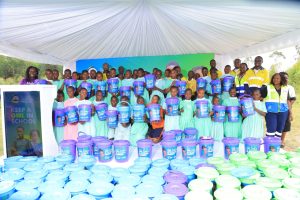In a bold move to keep girls in school and support their wellbeing, the East African Crude Oil Pipeline (EACOP) Ltd, in partnership with the Malaika ReusableSanitaryPads, has rolled out the “Keep a Girl in School” dignity campaign across 20 government schools in Rakai, Gomba, Ssembabule, Lwengo and Kyotera Districts.
The initiative, aimed at improving menstrual hygiene management, was officially launched at St. Apollo Kanoni Primary School in Kamuli Village, drawing hundreds of students, educators, and local leaders. 
The campaign targets rural schoolgirls many of whom regularly miss school due to lack of sanitary pads by providing essential dignity hampers.
Each hamper contains four packets of reusable sanitary pads, three pairs of underwear, detergent, and a bucket offering a sustainable and reusable solution to a pressing challenge.
“When girls have access to proper sanitary products, they can stay in school, participate fully, and pursue their dreams,” said Matred Murungi, Social and Environmental Investment Manager at EACOP.
She added that menstrual health is key to education equity:
“We are removing a major barrier to education and giving girls the opportunity to succeed and break the cycle of inequality.”
Mr. Kasumba Amos James, Head Teacher at St. Apollo Kanoni Primary School, underscored the gravity of the problem and the impact of the support.
“Out of our 1,203 students, 640 are girls. Many of them miss school due to a lack of sanitary pads. This partnership with EACOP and Malaika gives them the freedom and dignity they need to attend class consistently,” he said.
He emphasized that the donation will directly improve girls’ attendance, self-esteem, and academic performance.
Mirembe Monica, Head Prefect of Primary Seven, and Nagirinya Asera Maria, Head Girl of Primary Six, expressed how the campaign has lifted a heavy burden off the shoulders of many girls.
“This support helps girls manage their periods with confidence and comfort. Now we can focus more in class and not worry about missing school,” said Asera Maria.
While Rakai is the latest district to benefit, the campaign is part of a wider initiative reaching over 3,000 girls across Hoima, Kikuube, Mubende, Kyankwanzi, Lwengo, Kyotera, Sembabule, Kakumiro, and Gomba. The initiative aligns with Sustainable Development Goal 4, promoting inclusive and equitable quality education.
Human Rights Watch reports that one in ten girls in sub-Saharan Africa miss school during their menstrual cycle due to inadequate hygiene facilities and products—a problem the campaign seeks to confront directly.
Dorothy Awori, founder of Malaika Reusable Sanitary Pads, called for more than just pad donations. She urged for open discussions around menstruation, sexual health, and dignity in schools.
“Some girls resort to desperate measures just to manage their periods from using soil to exchanging sex for money to buy pads,” she revealed.
Awori cited alarming statistics from a 2021 UNFPA study which showed Uganda recorded 351,000 teenage pregnancies in the post-COVID year, with Buganda leading with 31,000. She applauded EACOP’s effort to respond meaningfully to the challenge.
Malaika is also taking a skills-based approach by teaching girls how to make their own reusable sanitary pads in art and crafts classes, and encouraging peer-led support systems.
The campaign has earned praise from district officials who see it as a model for transforming girls’ education.
“This is a life-changing intervention. EACOP and Malaika are not only contributing to infrastructure development but also ensuring social transformation,” said Mwanje Eddy, Deputy Resident District Commissioner of Rakai.
Nalubega Prossy, District Education Officer in charge of Special Needs, also applauded the initiative.
“This donation allows our girls to concentrate in class instead of worrying about embarrassment. It is a real game-changer.”
She emphasized that investing in girls’ education is an investment in national development, and called on more actors to scale up support for girl-centered education initiatives.